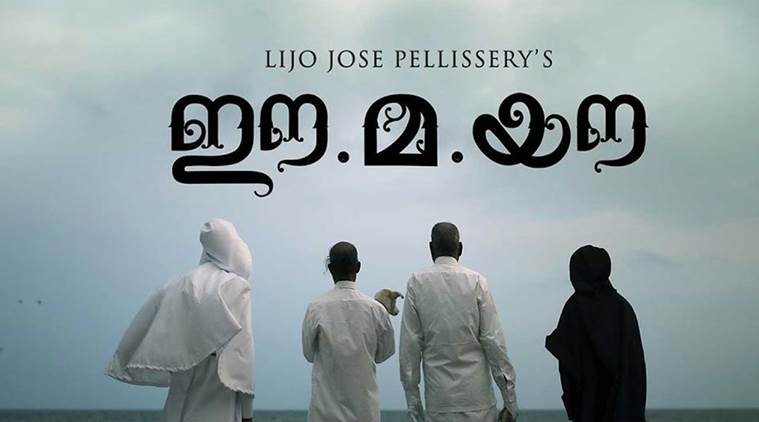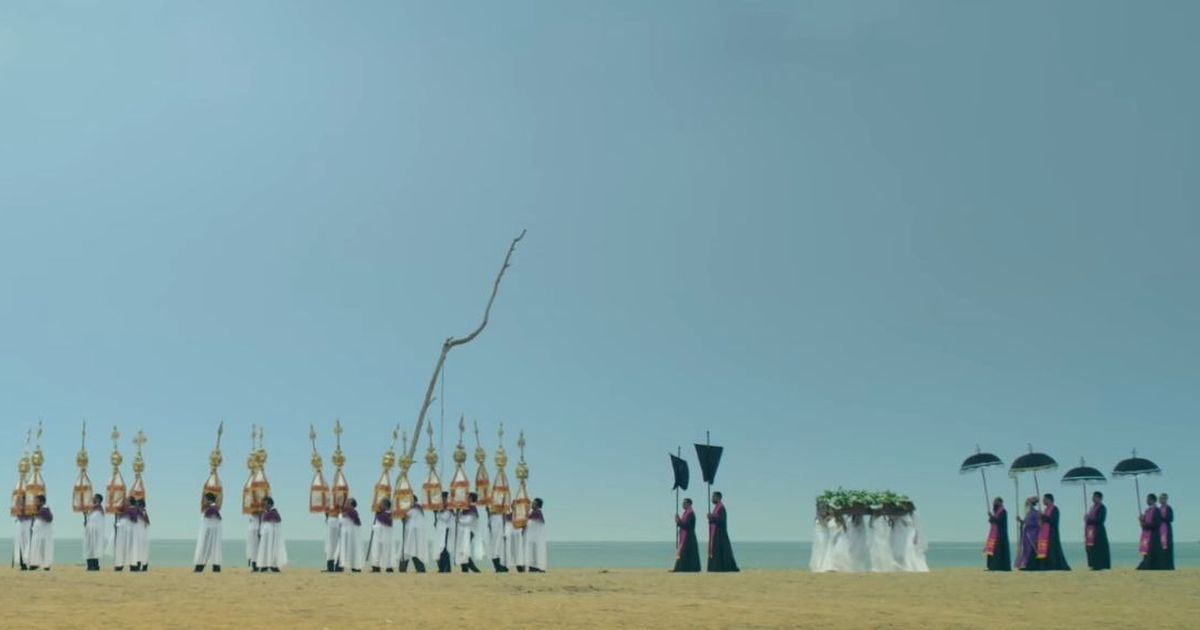
Even before the film begins, we hear the sea rumble with the air swiftly moving around. An indication of the coming storm, maybe. The actual movie begins with a grand funeral procession which looks exactly like the one a son promises to give his father later in the film. And in the backdrop is the sea—moving, unmoved. Through a stationary camera, we see the procession move along the length of the frame. In one shot, the film manages to discuss mortality and the temporary nature of human existence—everything comes and goes, except for the sea and the onlooker—without so much as a word. Lijo has this ability to make his characters and frames interact in a way where subtext and layering becomes a natural outcome, rather than a deliberate ploy, this film is no different.
Ee. Ma. Yau is a story of a death and the funeral that needs to follow. Vavachan, a footloose man dies suddenly and his family turns into a mess while trying to properly send him off. The son (Eeshi) who can’t seem to find time to cry, the wife (Pennamma) who cries on cue, the daughter-in-law (Zabeth) who tries to do her best, and the daughter (Nisa) whose mind seems to be elsewhere. Weaved into this plot is the story of a people—some help, some meddle, but all provide insights.
P. F. Mathews’ story is a complicated endeavour that tries to chronicle human behaviour around death. He fills it with interesting characters who wouldn’t survive for a second if their life depended on civility. The dead man’s brother is angry that he isn’t personally invited to the funeral. A neighbour tries to see trouble when there isn’t any and a priest who fancies himself a detective tries to add to it. A head nurse who seems displeased by everything and her husband who is perpetually trying to soften her sharp edges. A friend who volunteers to bathe the dead body, but chooses to powder his face first. Another friend who seems more invested in the proceedings than the son himself—played with emotional charitability by Vinayakan. We see many colourful people come and go, most of whom are as indifferent as they are supposed to be. Every actor gives their best to bring these people to life. From Chemban’s perplexed son, to Dileesh’s not-so-holy vicar, to Pauly’s over-conscious widow who thinks that the right way to conduct herself is to cry every time a new person comes to see the dead body. The way she switches from a woman in pain to a painful woman makes one chuckle, no matter how inappropriate.

The politics of death is an ugly business where closure only seems plausible after treading an unnecessarily strenuous path. And who better to bring it to life than the man who loves religious motifs and who finds drama in the most mundane places. The ending swiftly took me back to the delightful Amen—Lijo Jose Pellissery’s take on magic realism is charming, to say the least—and the score, by Prashanth Pillai, is a fitting companion that gets under your skin with ease. Especially the one that comes at the time of the ending credits.
The director’s mark can found in the way Eeshi treats his father’s mistress. She isn’t a mere woman anymore. She and her kids are a breathing record of his father’s misgivings. Only a man who understands human psyche for what it is can have his protagonist pull a crying woman by her hairs and throw her aside without fearing audience’s wrath. Or the way a Hitchcockian method of suspense is used to create a conflict that only we know of. We see a man trying to bring murder into the mix, and we see the priest and the nurse try to solidify this, but no one else knows about this. We are nervous for Eeshi, while he is ignorantly trying his best to stay afloat.
Ee. Ma. Yau is a rather busy tale—every frame is filled with details, every glance tells a story that the audiences are expected to catch. If one is not careful enough, things threaten to slip away. Take Nisa’s character development, for example. She begins to understand the difference between love and lust and we are made privy to this information by the way she looks at the clarinet player, who previously proposed marriage to her. Many things hide in plain sight in the film, but the subplot of death’s angels deciding to wait their time out by playing cards is a delightfully innovative thing to be vague about. When I finally figured it out, it left me smiling, despite the fact that Vavachan seems to be going to hell. I mean, he is an adulterer after all. So, fair is fair.
In the end, Ee. Ma. Yau. is about a son and his inability to say goodbye to his father without having a meltdown. We see the deep bond they share with that one scene by the veranda. But the warmth comes alive once his love for the old man starts to outpour in small yet remarkable ways after he dies—the way he tenderly touches his father’s photograph, or the way he inherits his father’s habit of speaking to himself. As such, Ee. Ma. Yau. is a striking cinematic experience that’s emotionally subtle and poignant, but if the idea is to look at the psychology of death and the people involved, then I prefer Don Palathara’s Shavam, a calmer and, hence, a more focused variant.